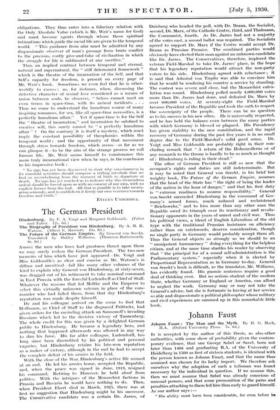The German President
Hindenburg. By F. A. N'oigt and Margaret Goldsmith. (Faber and Faber. 12s. &I.) The Biography of President von Hindenburg. By A. M. K. Watson. (Albert E. Marriott. 10s. 81.)
AMONG the men who have had greatness thrust upon them we may surely reckon the German President. The two new memoirs of him. which have just appeared—Dr. Voigt and Miss Goldsmith's as clear and concise as Mr. Watson's is diffuse and uncritical—fail like many other volumes of the kind to explain why General von Hindenburg, at sixty--seven, was dragged out of his retirement to take nominal command in East Prussia with the forceful Ludendorff as Chief of Staff. Whatever the reasons that led Moltke and the Emperor to Hied this virtually unknown veteran in place of the com- mander who had failed them, from that day Hindenburg's reputation was made despite himself.
He and his colleague arrived on the scene to find that Hoffmann, as Chief of Staff to the disgraced Prittwitz, had given orders for the encircling attack on Samsonoff's invading Russians which led to the decisive victory of Tannenberg. The whole credit for this was given by a delighted German public to Hindenburg. He became a legendary hero, and nothing that happened afterwards was allowed in any way to dim his fame. His far abler colleague, Ludendorff, has long since been discredited by his political and personal vagaries, but Hindenburg retains his late-won reputation as a maker of victory, although in the end he had to accept the complete defeat of his armies in the field.
With the close of the War, Hindenburg's active life seemed at an end. He led his armies home, accepted the Republic, and, when the peace was signed in June, 1919, resigned his command. Retiring to Hanover, he held aloof from politics. With the intrigues of the Monarchist factions in Prussia and Bavaria he would have nothing to do. Then, when President Ebert died in March, 1925, there was at first no suggestion that Hindenburg might be his successor. The Conservative candidate was a certain Dr. Jarres, of Duisburg who headed the poll, with Dr. Braun, the Socialist, second, Dr. Marx, of the Catholic Centre, third, and Thalmann, the Communist, fourth. As Dr. Jarres had not a majority of the votes cast, a second ballot was required. The Socialists agreed to support Dr. Marx if the Centre would accept Dr.
Braun as Prussian Premier. The combined parties would
obviously have elected their man against an unknown candidate like Dr. James. The Conservatives, therefore, implored the veteran Field-Marshal to take Dr. Jarres' place, in the hope that his legendary reputation would attract the non-party voters to his side. Hindenburg agreed with reluctance ; it is said that Admiral von Tirpitz was able to convince him that lie would be rendering his country a service by standing. The contest was severe and close, but the Monarchist calcu- lation was sound. Hindenburg polled nearly 4,000,000 votes more than Dr. Jarres had done, and defeated Dr. Marx by over 800,000 votes. At seventy-eight the Field-Marshal became President of the Republic and took the oath to respect the sovereignty of the people. There can be no question as to his success in his new ollice. He is universally respected, and lie has held the balance even between the many parties with which Germany is blessed or plagued. His Presidency has given stability to the new constitution, and the rapid recovery of Germany during the past five years is in no small degree due to the Field-Marshal's solid good sense. Dr. Voigt and Miss Goldsmith are probably right in their con- cluding remark that " A return of the Hohenzollerns or of any monarch to the throne is hardly to be so mudh as thought of : Hindenburg is ruling in their stead."
The office of German President is still so new that the occupant's rights and duties are still indeterminate. But it may be noted that General von Seeckt, in his brief but weighty book, The Future of the German Empire, assumes that the head of the State has " the right of being the leader of the nation in the hour of danger," and that his first duty is " extreme readiness to assume responsibility." General von Seeckt succeeded Hindenburg in the command of Ger- many's armed forces, much reduced and rechristened " Reichswehr," and to hint more than any other man the Republic owed its triumph over its reactionary and revolu- tionary opponents in the years of unrest and civil war. Thus his political views, a blend of English Liberalism of the old type with the traditional Prussian insistence on efficiency rather than on catchwords, deserve consideration, though no single party in Germany would probably accept them all. Thus the General objects as strongly as we should to an " omnipotent bureaucracy " doing everything for the helpless citizen, and at the same time startles his reader by observing that " the principal foe of a sound self-administration is the Parliamentary system," especially when it is elected by Proportional Representation as in Germany to-day. General von Seeckt's book is difficult, as the translator, Mr. Williams, has evidently found. His gnomic sentences require a good deal of thinking over. But no serious student of the modern State, whether Germany or England or America, can afford to neglect the work. Germany may or may not take the General's advice, but she is fortunate in having at her service so able and dispassionate a political philosopher whose military and civil experiences are summed up in this remarkable little book.










































 Previous page
Previous page